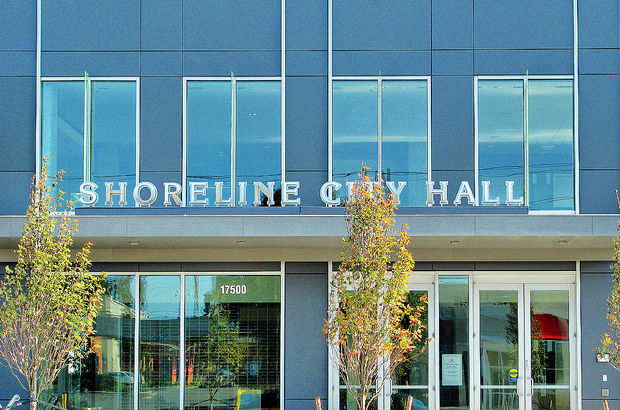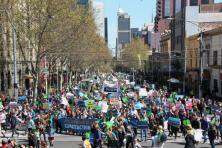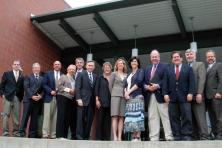|
Strongly supportive of climate action, the Shoreline, WA City Council is intent on shrinking its carbon footprint in half by 2030. On October 13, city staff and New Energy Cities Program Manager Elizabeth Willmott briefed the Council about the strategies that would put them on a path to achieving this goal, including partnerships in building energy efficiency and bolder action in low-carbon transportation.
The Value of Collective Action
Aggressive city action can reduce global carbon emissions collectively by at least 10% by 2030, according to a C40 report published at the UN Climate Summit. Also announced during Climate Week: the mayors of Los Angeles, Philadelphia, and Houston released a national climate action agenda to mobilize city support in advance of the next significant international climate meeting in Paris in 2015. However, the report and agenda are silent on the importance of smaller suburban cities in metropolitan area reductions, something that King County cities have begun to address through their July 2014 adoption of shared carbon reduction goals, and through the voluntary King County-Cities Climate Collaboration.
Renewable Cities
In historic news for Buffalo, NY, a former steel plant will be the home of SolarCity’s 1.2 million square-foot facility to produce high-efficiency solar photovoltaic (PV) panels. SolarCity plans to invest $5 billion in the site, and will reportedly create more than 1,450 direct manufacturing jobs.
Burlington, VT will source 100% of its electricity from renewable power, with the purchase of a 7.4-megawatt hydroelectric plant on the city’s border. Plans are also underway in nearby Rutland, VT for Green Mountain Power and NRG Energy to shift toward distributed energy by offering customers a combination of energy management software, energy storage, electric vehicle (EV) infrastructure, and community solar.
Electrifying Cities
Berkeley, CA will help residents without land install EV charging stations in curbside areas, thanks to the Schmidt Family Foundation’s 11th Hour Project. Other West Coast recipients include the Columbia Willamette Clean Cities Coalition and the Pacific Coast Collaborative, which will jointly promote electrified fleets; and Drive Oregon, which will support businesses in providing charging for employee EVs and generate private sector support for EV policy.
Three thousand miles east, Brooklyn, NY developers are embracing EV charging stations as a green market advantage for the condos they are selling. Still further east, across the Atlantic, the English town of Milton Keynes is piloting electric-powered driverless cars, which use sensors to navigate and can be booked by smartphone.
The Twin Imperative: Carbon Reduction and Preparedness
The New Energy Cities program focuses on carbon reduction, but we understand that communities must also prepare for climate impacts, and that climate change is already having disproportionate consequences for disadvantaged communities, as Harvard public health researchers recently found in a study of heat-related deaths in New York City.
The White House and the US Department of Energy announced the Climate Action Champions contest to recognize city leaders committed to both carbon reduction and preparing for local climate impacts. The competition does not include funding, but the winning cities could be eligible for funding in the future.
Upcoming Events
- October 28, 2014: Sustainable Path Foundation will hold a seminar on climate change in the Northwest, featuring speakers from the University of Washington Climate Impacts Group, Seattle City Light, and the Center for Sustainable Infrastructure at Evergreen State College.
- November 5, 2014: The Northwest Environmental Business Council and the Washington State Department of Commerce will hold its fifth annual Washington Future Energy Conference
- November 7-8, 2014: NW Energy Coalition will host its annual NW Clean and Affordable Energy Conference at the Crowne Plaza hotel in Portland, OR, featuring Opower’s Nancy Hersh as the keynote speaker.
- November 12, 2014: The Washington Clean Tech Alliance’s third annual meeting, at Seattle’s Olive 8 hotel, will feature Jules Kortenhorst, Chief Executive Office of the Rocky Mountain Institute.
|









